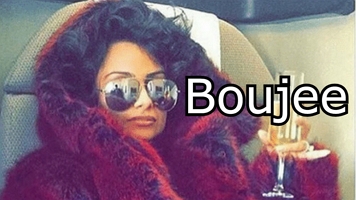Boujee Meaning: The Definition, Use Cases, Evolution, and More
Bougie, this word might ring a bell as perhaps you've been called it for solely shopping at Grocery marts in bulk or drinking ridiculously expensive rosé. Perhaps you've insulted a companion with the bougie slang word who can't quiet down about her new Anastasia Beverly Hills highlighter. Perhaps you've been standing by listening to rap bunch Migos' outline clincher Terrible and Boujee on rehash.

Yet, the question arises, where does the term originate from, and what is boujee's meaning?
1 The Origins of the Word 'Boujee'
So what does bougee mean? Boujee is an internet slang that refers to a person who indulges in a luxurious life and spends a lot of money on flashy stuff.
Indeed, although it could appear so in 2017, bougie's definition has a 100-year history (and numerous spellings) tracing back to progressive France before stemming off into varieties of the shoptalk word we know today.
So bougie or boujee, and bourgie all originate from the bourgeoisie. This French word signifies "working-class status."
Karl Marx, the creator of the Socialist Statement, utilized two kinds of monetary status to outline a class battle (and back for socialism over private enterprise): the bourgeoisie and the low class.
In the communist way of thinking, the bourgeoisie were the proprietors and makers of industrialization and manufacturing. They regularly esteemed property and benefits and kept up with their cultural status. (The working class was the common laborers. Proletarian is shoptalk for "low status"; however, it's not utilized all that much nowadays.)
In any case, the middle-class modifier structure became a more nonexclusive portrayal of center/upper-working class realism after some time.
2 The Uses of the Word 'Boujee' Today
The latest cycle of the average is "bougie" or "boujee," used to depict top-of-the-line, and possesses a flavor like driving your Prius to get avocado toast after SoulCycle.

It's an equivalent open-door hit at anybody from trendy people and the waterfront tip-top to the rural or fundamental. The "boujee" variety (utilized by Migos in Bad and Boujee) usually alludes to working-class or upwardly versatile individuals of color.
Metropolitan Word reference's top passage for bougie characterizes it in this manner:
"Trying to be a higher class than one is. Gotten from middle-class - importance center/privileged, customarily detested by socialists is what boujee means."
So in cutting-edge English, somebody who is bougie is making a demeanor of riches or privileged status — regardless of whether it's valid.
3 Use of the Word 'Boujee' In Pop Culture
The far-reaching utilization of bougie these days has ignited a discussion about the allotment. In any case, it's convoluted, similar to its implications.
Virtuoso refers to Migos' Bad and Boujee as "a snare song of devotion about bringing in cash and investing energy with ladies who have costly desires. 'Boujee' is a purposeful incorrect spelling of 'bougie,' which is shoptalk for higher-class, and alludes to the realism of society's working class."

Ke$ha utilized the word much the same way in her 2010 song as well.
In any case, not every person concurs that these two renditions even mean the same thing.
4 Evolution of the Word 'Bougie' Definition
The History of ourgeoisie
In middle-aged France, the expression "middle or high-class" implied a resident or freeman who lived in a town rather than an open country.
These alleged freemen were essential for the laborer class. They were, much of the time, unfortunate ranchers who possessed little plots of land and had essential social equality.
Per the medieval class arrangement of the time, freemen fell way underneath honorability — the masters and women who possessed the land resided in extravagant homes and cared for the towns.
However, freemen fell way above enslaved people and serfs. Enslaved people were individuals who traded like normal merchandise. Serfs fared minimal better. They couldn't possess the land. They couldn't wed or try and leave the town without their master's assent, and they went through their days working the land claimed by their ruler. They were paid means compensation, best case scenario.
In this manner, freemen, in a real sense, made up a working class that fell between respectability on one side and serfs and enslaved people on the other. After some time, "average" came to mean anybody in this working class — in any country, not simply France.
Evolution of Defining Bougie
Throughout yet additional time, it came to allude to any individual who held what were viewed as working-class values. The Oxford English Word reference records these as "narrow-minded realism, ordinary decency, and absence of creative mind."
The term 'bougie person' turned out to be much more pointed in the eighteenth century when communists went along. They saw "the upper-middle-class" as being in direct struggle with "proletarians," or the average individuals. The average was believed to be distracted with realism, assets, and, consequently, allies of private enterprise.
During the 1960s, the short type of "upper-middle-class" — "bougie" or "bourgie" — came into utilization. It was utilized negatively to mean somebody with goals over their station: individuals who were overextending or taking a stab at a degree of decency they didn't have.
What Does It Mean when Someone Calls You Bougie?
Today, calling someone a bougie can mean quite a few things because the meaning of a bougie has changed quite a lot.It can mean extravagant, bombastic, mark cognizant, excessively hipsterish, cash-fixated, or nouveau rich. It holds a general feeling of individuals who believe they're fashionable yet truly aren't. A model from the admired Metropolitan Word reference is somebody wearing creator garments and glasses while figuring out their coupons at Target.

Kids nowadays would refer to that as "bougie."
So while "common" initially did imply "working class," today, it has a substantially more regrettable underlying meaning.
5 Examples of Word 'Bougie' Used Typically
Examples of typical use of the word Bougie as an Adjective:
- That girl is all bougie, purchasing garments and shoes every other day because she doesn't do clothing. She won't eat cheap food. I told her she assumed she was extravagant since she was too bougie to eat some Burger Ruler!
- I can't accept that Terrell is with that young lady; she is approaching bougie like she is excessively great for somebody.
Examples of the use of the word Boujee online:
- Individual 1: Did you converse with Jessica about the end of this week's plans?
- Individual 2: Not yet, cuz she is acting so bougie, as she doesn't want to be seen in sure places or doing specific things. She said she is contemplating going to the South Ocean side or something bougie like that.
- Individual 1: She better check herself, she wasn't too great to even think about going to the football match-up a year ago! Shoot! Presently she wants to be all bombastic!
Examples of the use of the word Bougie typically as a noun:
- Young lady 1: Bestie, did you hear what Tony said his objective in life is?
- Young lady 2: Naw bestie, What he say?
- Young lady 1: Bestie being bougie! In the talking session, he burnt out on playing with
Syndication cash, he would keep pursuing paper until he had two or three manors and a Tesla. I was unable to quit giggling.
6 How to Talk to Your Kids About the Word 'Boujee'
If you catch your child speaking a slang word like Boujee in an appropriate or insulting manner to someone else, here is what you can do:
Convey Your Family Values to the Child
Converse with your kid about how various individuals have various qualities. While you probably won't find swearing hostile, certain individuals do. If your family doesn't swear, ensure that your kid knows that even though they could hear abusive words from others, that doesn't mean it lines up with your family's qualities.
Dig Out the Reason
While choosing how to address swearing, check out the potential purposes behind your youngster's selection of words. How and where the swear word was utilized is significant. A 5-year-old rehashing a word they heard on the transport differs from a 15-year-old swearing at an educator.
Ignore Attention Seeking Stunts of your Child
Children will frequently rehash conduct that acquires a ton of attention. If you giggle or overplay a reviled word, it's ensured your kid will say it in the future. Disregarding the way of behaving can be a decent system, to begin with, particularly for small kids.
Final Word
If you are looking for a parental control app to restrict the exposure of some words for your children on their mobile phones or social media apps, check out AirDroid Parental Control. This app will allow you to keep an eye on your child's digital activities and restrict any websites or words you do not want your child to get exposed to.











Leave a Reply.